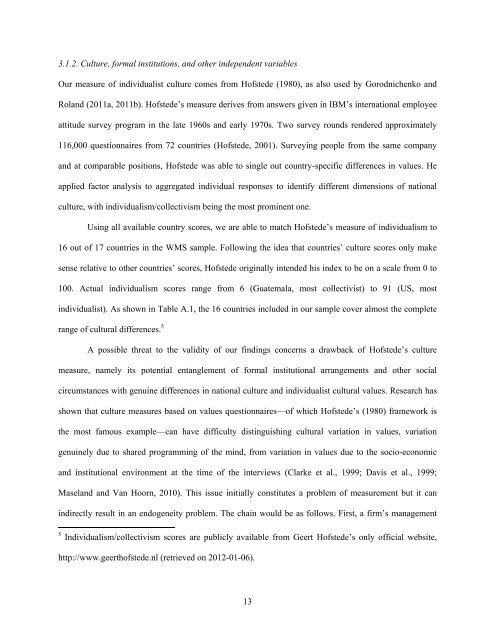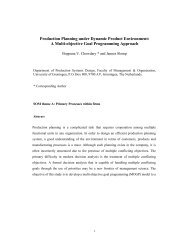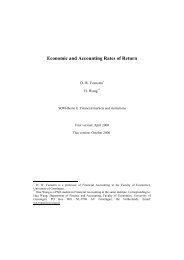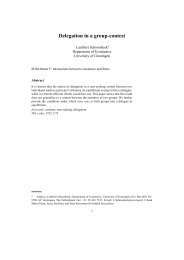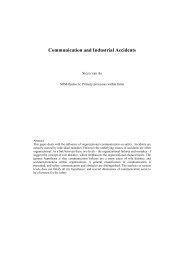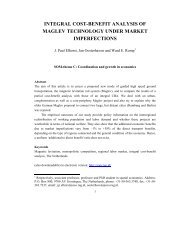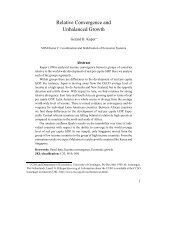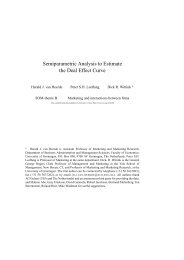Individualism and the cultural roots of management practices
Individualism and the cultural roots of management practices
Individualism and the cultural roots of management practices
Create successful ePaper yourself
Turn your PDF publications into a flip-book with our unique Google optimized e-Paper software.
3.1.2. Culture, formal institutions, <strong>and</strong> o<strong>the</strong>r independent variables<br />
Our measure <strong>of</strong> individualist culture comes from H<strong>of</strong>stede (1980), as also used by Gorodnichenko <strong>and</strong><br />
Rol<strong>and</strong> (2011a, 2011b). H<strong>of</strong>stede’s measure derives from answers given in IBM’s international employee<br />
attitude survey program in <strong>the</strong> late 1960s <strong>and</strong> early 1970s. Two survey rounds rendered approximately<br />
116,000 questionnaires from 72 countries (H<strong>of</strong>stede, 2001). Surveying people from <strong>the</strong> same company<br />
<strong>and</strong> at comparable positions, H<strong>of</strong>stede was able to single out country-specific differences in values. He<br />
applied factor analysis to aggregated individual responses to identify different dimensions <strong>of</strong> national<br />
culture, with individualism/collectivism being <strong>the</strong> most prominent one.<br />
Using all available country scores, we are able to match H<strong>of</strong>stede’s measure <strong>of</strong> individualism to<br />
16 out <strong>of</strong> 17 countries in <strong>the</strong> WMS sample. Following <strong>the</strong> idea that countries’ culture scores only make<br />
sense relative to o<strong>the</strong>r countries’ scores, H<strong>of</strong>stede originally intended his index to be on a scale from 0 to<br />
100. Actual individualism scores range from 6 (Guatemala, most collectivist) to 91 (US, most<br />
individualist). As shown in Table A.1, <strong>the</strong> 16 countries included in our sample cover almost <strong>the</strong> complete<br />
range <strong>of</strong> <strong>cultural</strong> differences. 5<br />
A possible threat to <strong>the</strong> validity <strong>of</strong> our findings concerns a drawback <strong>of</strong> H<strong>of</strong>stede’s culture<br />
measure, namely its potential entanglement <strong>of</strong> formal institutional arrangements <strong>and</strong> o<strong>the</strong>r social<br />
circumstances with genuine differences in national culture <strong>and</strong> individualist <strong>cultural</strong> values. Research has<br />
shown that culture measures based on values questionnaires—<strong>of</strong> which H<strong>of</strong>stede’s (1980) framework is<br />
<strong>the</strong> most famous example—can have difficulty distinguishing <strong>cultural</strong> variation in values, variation<br />
genuinely due to shared programming <strong>of</strong> <strong>the</strong> mind, from variation in values due to <strong>the</strong> socio-economic<br />
<strong>and</strong> institutional environment at <strong>the</strong> time <strong>of</strong> <strong>the</strong> interviews (Clarke et al., 1999; Davis et al., 1999;<br />
Masel<strong>and</strong> <strong>and</strong> Van Hoorn, 2010). This issue initially constitutes a problem <strong>of</strong> measurement but it can<br />
indirectly result in an endogeneity problem. The chain would be as follows. First, a firm’s <strong>management</strong><br />
5 <strong>Individualism</strong>/collectivism scores are publicly available from Geert H<strong>of</strong>stede’s only <strong>of</strong>ficial website,<br />
http://www.geerth<strong>of</strong>stede.nl (retrieved on 2012-01-06).<br />
13


